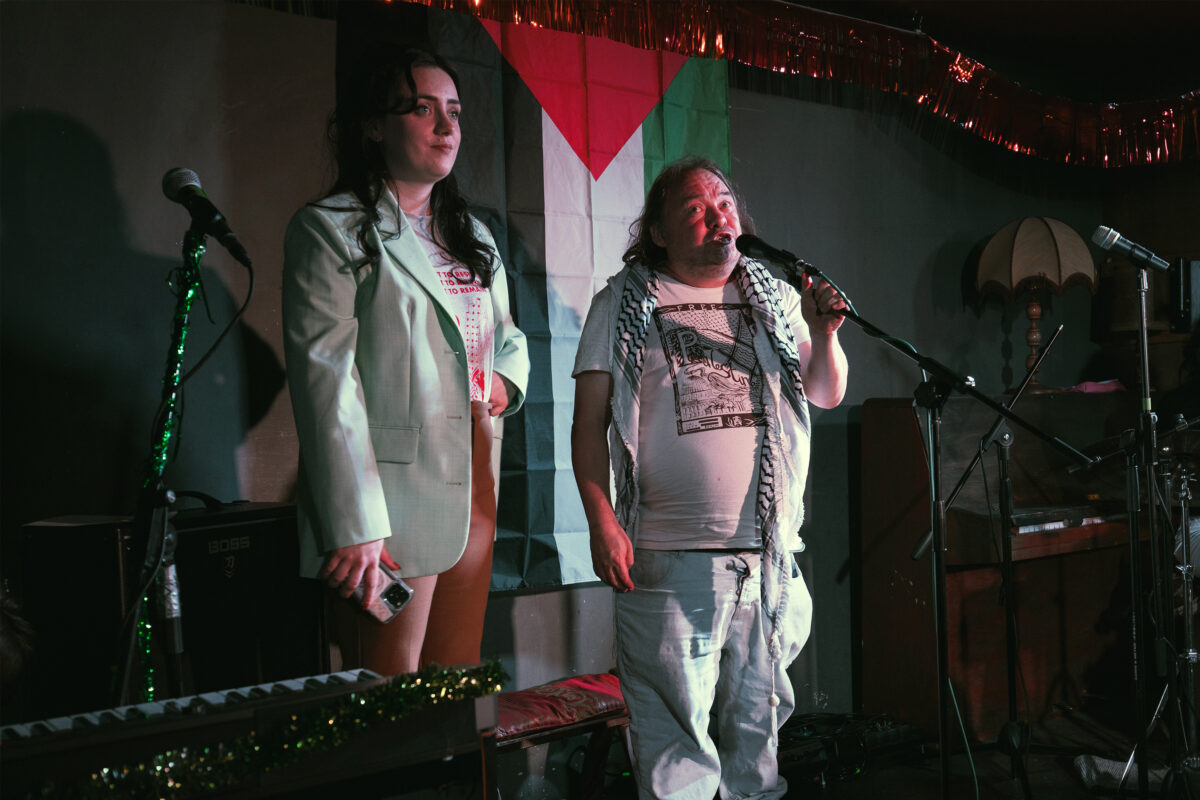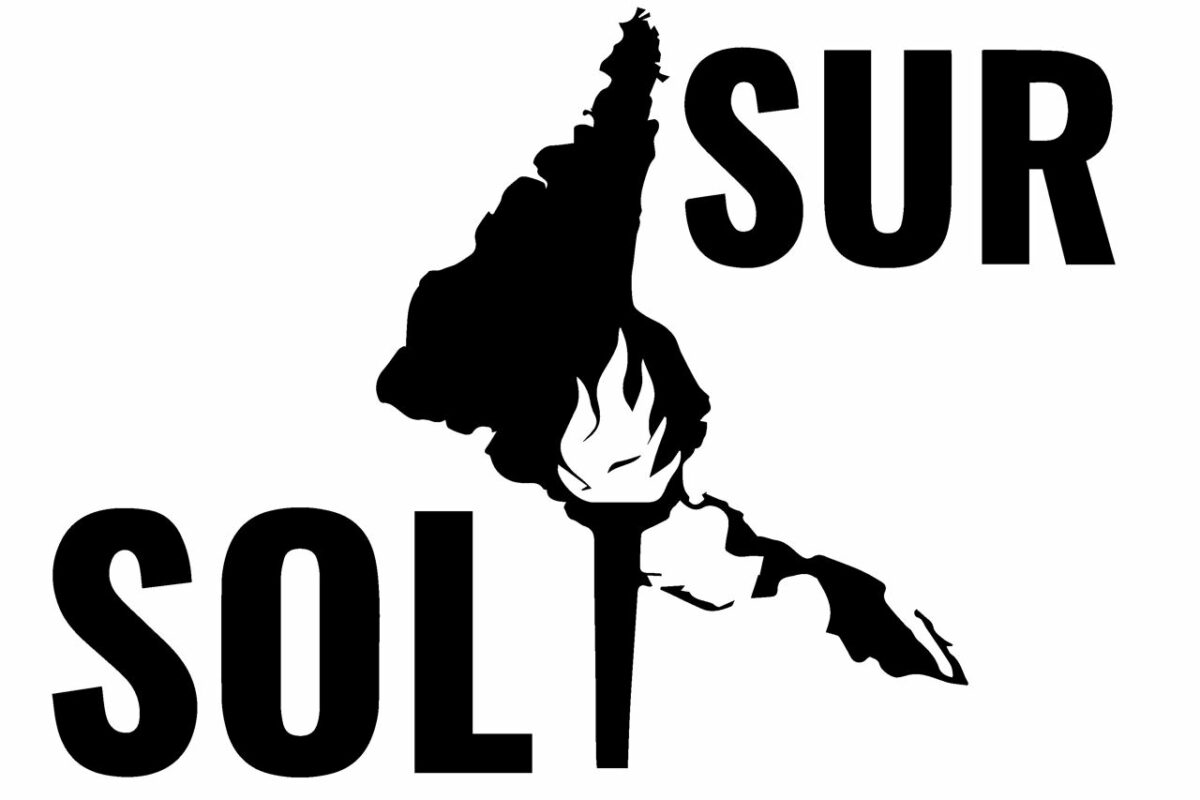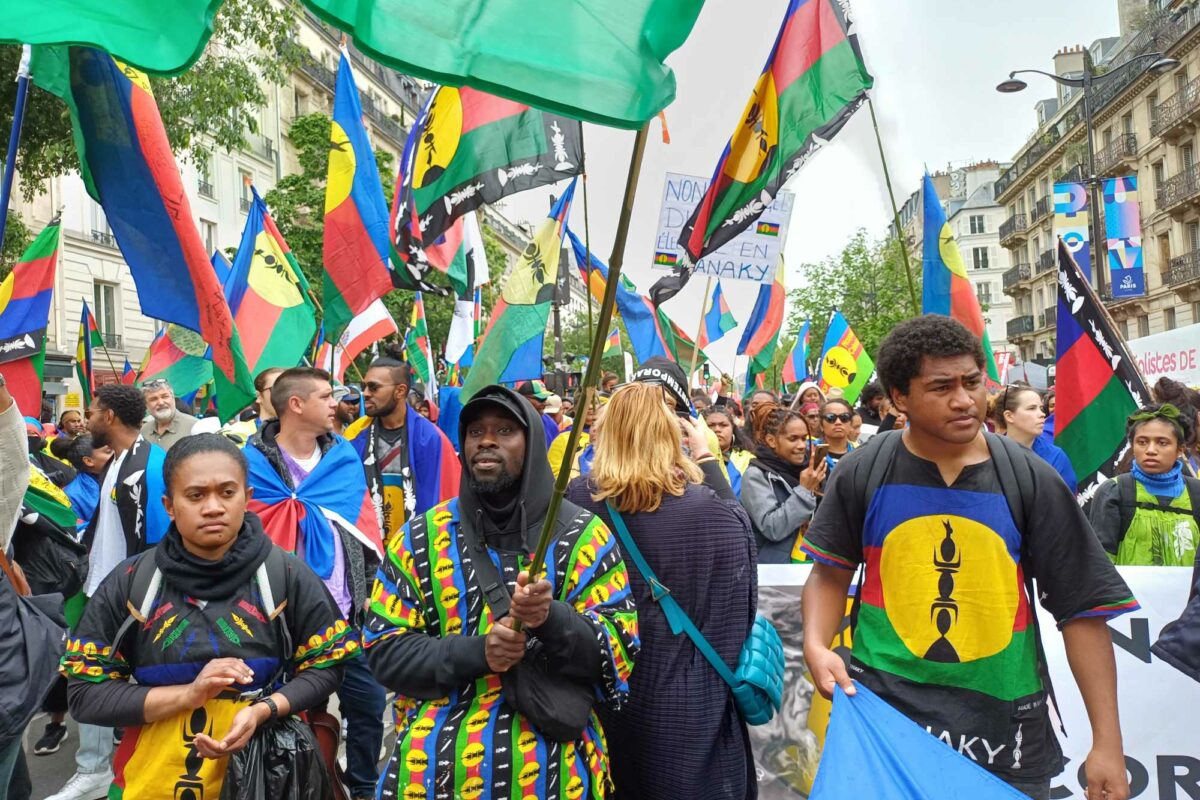by Phil Butland and Aubane Décobert
On Saturday, the 11th of May, something incredible happened. Well over a hundred people packed into the cellar of the AlHamra restaurant to listen to 10 live acts and 6 speakers talk about Palestine solidarity in Germany. We raised €2,000 for the European Legal Support Centre, a leading force in supporting the victims of repression at Palestine demonstrations in Germany. And we managed to create a space for people to build community and enjoy themselves – at least as much as was possible during the ongoing genocide.
And yet, four weeks before the event took place, no-one had even considered organising anything. This article is the story of how we staged Palivision. We hope that it can help anyone who is organising future Palestine solidarity events, in particular in the cultural arena.
Coming up with the idea
It all started on the 14th of April. After the Palestine Congress had been banned, theleftberlin livestreamed the press conference explaining what had happened. After the livestream, one of the participants of the press conference, Abdallah Abdelhad, joined us to discuss what to do next.
We shared a lot of great ideas, but had no concrete plan about the next action. After everything was over, a group of us sat outside AlHamra, where we had held the discussion. One of us, who had been active in Belgium, told the rest about a concert which was being organised there as an alternative to Eurovision. We now had a concept.
The Eurovision Song Contest has always been a central part of Israel’s attempt to portray itself as being a normal democracy (aka “Pinkwashing”). Just as Apartheid South Africa tried to normalise itself through its cricket and rugby teams, Israel’s regular Eurovision performances were part of the Hasbara campaign to pretend not just that Israel respected democratic rights, but that it was a haven for LGBT people (just as long as those LGBT people are not Palestinians, naturally).
Eurovision 2014 had already stirred controversy. Israel’s Eurovision entry celebrated the country bombing Gaza to rubble – so much so that it had to be re-written before it was accepted by Eurovision’s organisers, the notoriously conservative and genocide-friendly European Broadcast Union.
The next step
Our concept was still vague, so we decided to meet up a week later before our weekly Palestine Reading Group. That week we’d decided to show our solidarity for the Camp for Gaza opposite the Bundestag by staging the reading group there. It was now 3 weeks before Eurovision and we still had no real plan and no line up, just the vague idea that we need to do something.
We decided to invite Palestine-friendly bands plus a range of speakers who could explain what we could do to mobilise against the destruction of Palestine. In the week before the meeting, we started to reach out to artists who we knew from Palestine solidarity actions. We also started to place requests in online Palestine solidarity groups to appeal to interested performers.
The response was overwhelming. As well as the artists we already knew, we got a stream of messages from musicians who had heard that we were organising something, and were keen to get involved. Within a few days we had 12 artists from 11 different countries – a great sign of the internationalism of our resistance.
The breadth of what was on offer came not just from the artists’ nationalities but from the music on offer, from jazz to singer songwriters, from spoken word performances to Europop. The diversity of the people on stage represented the diversity of our movement. This is something we will need if we are going to build actions for Palestine which are both large and broad.
Finding speakers
The next thing was the speakers. We wanted a range of speakers who represented our attempt to push out and reach new layers of potential Palestine activists. Two new organisations Klima4Palästina (climate movement) and Gewerkschafter4Gaza (trade unions) sprang to mind. It was also obvious that we should also invite people from Palästina Kampagne who were organising the coming Nakba Day demo.
No Palestine meeting is complete without the Jüdische Stimme (JS). Just as we were discussing their participation, Udi Raz from JS walked past. We called over Udi, who said she’d be delighted to appear. For our final speaker, we invited Nadija Samour, a Palestinian lawyer who has fought tirelessly for people affected by police repression in Germany.
We had already taken the decision that this was not going to be a charity event. Although we need to collect money for Gazans who are living in desperate conditions, we wanted Palivision to be more engaged in German politics and the struggle here. Hence the decision to collect money for the ELSC, who, together with Nadija, are suing the German government for its support for genocide.
Our decision to raise funds for the ELSC was also based on the fact that any demonstration or event showing support for Palestine is heavily repressed by the German state, leading to countless arrests. Supporting Palestine can be done at different levels, by supporting Gazans and also by organizing the local resistance. Because of Germany’s high implication in the conflict, with the German state being the second biggest arms exporter after the US, it is important for Palestine support groups to stay strong, and the ELSC provides them with legal support and backing.
The day itself
While we were expecting a decent turnout, we were still surprised by the level of interest on the night. We had announced that the first act would go on at 7pm, but there were people queuing up 2 hours before the start time. By 6.10pm we were having to turn people away as no-one else could fit into the room. Fortunately, Café Karanfil agreed to show our livestream to people who wanted to watch together.
Some people asked why we could have not chosen a bigger venue. Firstly, it is becoming increasingly difficult to find a venue in Berlin which is prepared to host an event for Palestine. This is not just about corporate venues. In recent months, left wing spaces like the Syndikat pub, SO36 and the Neues Deutschland building have refused to hold events because of the organisers’ support for Palestine.
On top of this, even if we could have got more people, we weren’t sure whether we wanted to meet in a soulless enormodrome. Palivision was intended to be an intimate gathering where people could get together and organise for the future. In AlHamra we were able to offer both an atmosphere of solidarity and an environment in which people could bond together. If we decide to repeat the experience, let’s see which venues are on offer and what passes best.
We are proud of all our acts and what they provided for no payment. They also gladly shared equipment and helped each other out. Unfortunately, two artists had to pull out at the last minute because of illness, but they remained part of the discussion between artists about building Palivision and what we can do in the future.
Lessons learned – what could we have done better?
If you are organising an event which takes place 4 weeks after you decide to start planning, you’re not going to get everything perfect. We benefitted from a lot of good luck and from the support of everyone involved – from the artists to the venue owners and staff. But if we want to organise a similar event in the future, we will give ourselves much more time, and give more consideration to some aspects, including the following.
Find a suitable venue. No venue is perfect, as some of your needs can contradict each other. It would be nice to have an intimate space, but one with space for everyone who wants to come as mentioned earlier. There should be disabled access – which is not always available. Above all, particularly in Berlin, you need a place which is willing to hold an event for Palestine, and will not cave into the inevitable pressure to cancel. You probably won’t get everything you want, but it’s worth spending time to consider what you want to help make an informed choice.
Have several people who can look after sound. We woefully misjudged the contribution of a good sound engineer. Although two people with the requisite skills did a remarkable job at the night, the positioning of the mixer meant that they were both employed all evening. To save them stress, and to provide a good service for the musicians, we should have had much more back up. As one of the sound engineers said: “find your sound people before you think of the first act.”
Do not allow people in too early. Because of the swell of people, we opened the doors long before the announced time. This disrupted the soundchecks, which were still going on, and the decoration the room. In the future we should announce an earlier start time, but use this to only stamp the hands of audience members so they are guaranteed entry later. The doors should remain closed until we are ready.
Look after the artists. Different artists have different requirements, especially on the day itself. Sound checking too early is not always possible for live acts because changes in temperature and humidity will affect instruments. Check how much time each artist needs, and manage their expectations. We somehow managed, but this job was in the hands of too few people.
Find a suitable running order. For similar future events, the aforementioned artists’ requirements should be taken into account to establish a running order. We ended up having too many spoken word acts late and close to each other. As the evening goes on, an audience is increasingly interested in music and dancing.
Ensure the content of songs fits the event. At Palivision, it was brought to our attention that some people – including Palestinians – felt offended by one song. We issued an on-stage apology as soon as we could, but this damaged the preservation of a safe environment which should have been our first priority. As one of our members stated: ‘The second that a Palestinian felt unwell, we failed’. For future events – for which we would have more preparation time – we need to work more closely with the artists to ensure that the content provided is appropriate for our expected audience.
Using existing infrastructure
We would not have been able to build such a large event so quickly without an existing network of activists, but even this network was relatively young. One year ago, theleftberlin was mainly a website which worked together with the LINKE Berlin Internationals around specific public meetings, Küfas and other events.
October 7th – or rather the genocidal Israeli reaction to October 7th and Germany’s supine support for this genocide – changed all this. We set up a weekly Palestine Reading Group, mainly because people kept asking us for recommendations and nothing else was being organised. The reading group brought together a group of people who had for the most part not been involved in political activity in Germany, but needed to act against the genocide.
As time passed, the role of the reading group changed. What started as a haven for people who wanted to discuss the bombing of Gaza without losing their German friends rapidly became more interventionist. At first, we just went to demonstrations together. Gradually the meetings to organise theleftberlin, which had been poorly attended, started to fill up with fired up people with creative ideas.
At the May 1st festival in Mariannenplatz, theleftberlin stall showed our new dynamism. Most years at the festival we do little more than hand out a few leaflets. This year saw a vibrant event staged by dozens of activists selling t-shirts and tote bags, and engaging with people (yes, even White Germans) about what they can do for Palestine. May 1st set the scene for Palivision.
We learned that small scale actions can have much larger results. When we first set up the reading group, we were expecting that it would last 2 or 3 weeks. We are soon to have our 25th weekly meeting. But this is not just a group which talks abstractly about changing the world – we are acting on our discussions and actively intervening to build the movement.
What next?
Some artists have already asked if we will be organising a Palivision II. This would depend on Israel continuing to commit war crimes, and the EBU cravenly doing nothing to punish them. As both of these things are highly likely, you may not have seen the last of us.
But we do not have to wait a year before we do anything. We now have a network of artists who are keen to make their contribution – both to supporting Palestine and Palestinians, and to more general political work. Theleftberlin will be meeting at the beginning of June to discuss our future activities, and utilising this excitement.
It’s not just about theleftberlin. We are currently experiencing a mass movement for Palestine which is starting to cross the border into Germany. Palivision shows what is possible if we are audacious enough. We need more of this audacity if we are going to continue to successfully fight for a free Palestine.
Everyone can make their own contribution. What could you do?




